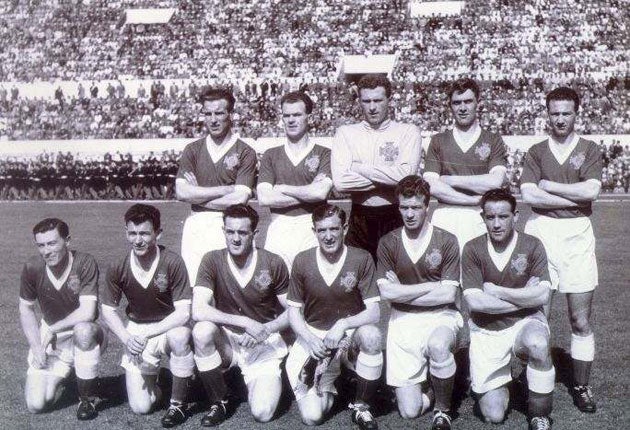Tommy Casey: Wing-half who won the FA Cup with Newcastle and played in the 1958 World Cup for Northern Ireland

Nobody tried harder on a football pitch than Tommy Casey, and his prodigious efforts took him to centre-stage on some of the game's grandest occasions.
The effervescent Ulsterman ran out for Northern Ireland to face a French team which included the goal machine Juste Fontaine in the quarter-finals of the 1958 World Cup in Sweden, and his sweat lubricated the Newcastle United machine as the Magpies beat Manchester City at Wembley to lift the FA Cup in 1955, still their most recent major domestic trophy.
Casey wasn't the most subtle of operators and he wasn't always first choice for club or country, but when he was picked the tenacious wing-half, whose tackles called to mind a speeding bulldozer and who routinely worked himself to a standstill in his team's cause, rarely failed to make his presence felt. Yet all that ferocious on-field activity belied the essential good nature of the former trainee bricklayer from County Down who had been brought up in the gritty environs of Belfast's Shankill Road. He revelled in the cut and thrust of dressing-room banter and his infectious humour made him a popular figure throughout his extensive travels during more than a quarter of a century in the sport.
Casey's professional journey began at Second Division Leeds United, who recruited him from Bangor, an Irish amateur club, in May 1949. But he made scant progress at Elland Road and moved down a tier, with Bournemouth, after only one season in England. Over two campaigns at Dean Court, Casey became acclimatised to the English game, impressing the Newcastle United scout and former St James' Park idol Bill McCracken sufficiently to earn a £7,000 transfer to Tyneside in August 1952.
Now Casey moved into his energetic prime, although during his six years in the top flight with the mid-table Magpies he was never guaranteed a first-team place, having to contest the left-half berth with local boy Charlie Crowe. The highlight of his Newcastle sojourn came in 1954-55, a season in which Crowe had held the upper hand. However, Crowe suffered injury problems, meaning that Casey played in six FA Cup games, including the final in which Newcastle triumphed 3-1 after making a flying start through Jackie Milburn's first-minute headed goal.
Casey also made his international breakthrough that season, earning the first of his dozen caps for Northern Ireland in a 3-2 defeat by Wales in Belfast, standing in for the injured Bertie Peacock. The Northern Ireland manager Peter Doherty held Casey in high esteem, loved his unbridled enthusiasm as a midfield ball-winner, but also valued his versatility, which made him an ideal squad man. Thus, occasionally, the resilient wing-half was deployed in a more creative role and sometimes even as an all-out attacker.
He featured in three World Cup qualifiers, contributing a goal in a 3-0 home win over Portugal, and although he was out of the team as the finals started in the summer of 1958, he was called up as a centre-forward to face West Germany in the final pool game in Malmo. Casey bustled effectively in a 2-2 draw which earned the Irishmen a play-off meeting with Czechoslovakia, for which he was replaced by Jackie Scott. The game ended in a heroic 2-1 victory thanks to two goals by Peter McParland.
He was back in the side – which featured the stellar likes of captain and fellow wing-half Danny Blanchflower, the brilliant inside-forward Jimmy McIlroy and Harry Gregg, voted the best goalkeeper in the tournament – for the last-eight encounter with France at Norrkoping.
Operating at inside-right (a supporting role to the striker) and making light of a gashed shin which carried four stitches, Casey gave a characteristically high-octane performance. But the Irish, most of whom were playing their second game in three days, looked tired as a team and fell to a 4-0 defeat, two of the goals coming from the prolific Fontaine.
On returning from Sweden, 28-year-old Casey joined First Division Portsmouth in an £8,500 deal and retained his Northern Ireland place for their next game, at home to England. Proudly wearing the No 9 shirt, he scored in a 3-3 draw but slipped out of the international reckoning after one more outing.
Life at Fratton Park proved a struggle, with Pompey doomed to demotion from the top tier, but Casey left just before they were relegated. In March 1959, a £6,000 fee took him to Second Division Bristol City, where he was reunited with Doherty, his Northern Ireland mentor.
Though the Robins, too, proved less than buoyant, sinking to the Third Division in 1960, Casey earned both respect and affection at Ashton Gate, where he remained until 1963, stretching his senior appearances beyond 400. There followed a spell as player-manager of non-League Gloucester City, a succession of coaching jobs including stints at Everton and Coventry City, and two management posts, with Distillery in Belfast and then Grimsby Town.
At Blundell Park, where cash was in short supply, he steered the Mariners clear of relegation to the basement division in successive seasons and launched a successful youth policy, but he was sacked in November 1976 with his team destined for demotion in the spring.
Casey later worked as a fishmonger in the Bristol area, still as lively as ever and relishing the craic with his customers.
Thomas Casey, footballer and manager; born Comber, Northern Ireland 11 March 1930; played for Leeds United 1949-50, Bournemouth 1950-52, Newcastle United 1952-58, Portsmouth 1958-59, Bristol City 1959-63; managed Distillery 1967-68, Grimsby Town 1975-76; capped 12 times for Northern Ireland 1955-58; married Margaret (one son, one daughter); died Nailsea, North Somerset 11 January 2009.
Join our commenting forum
Join thought-provoking conversations, follow other Independent readers and see their replies
Comments
Bookmark popover
Removed from bookmarks